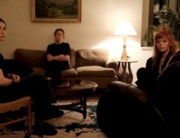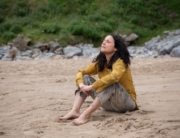
It’s the year 1999, a mere month before the 20th century comes to an end, but Trond (Stellan Skarsgard) isn’t feeling the festive mood. Formally a longtime Swedish resident, he now lives alone in Norway after his wife of 38 years died from a car accident. He survived, but the guilt of being the driver, of accidentally causing someone else’s death, persists. Out Stealing Horses revisits this theme repeatedly in a character drama that, while occasionally lopsided, clearly wants its visuals to convey the emotional stakes.
Trond’s solidarity is eventually disrupted when a neighbor comes to his house looking for his dog. Little does the man, Lars (Bjorn Floberg), realize that the men have met before. We then shift focus to 1948, where a 15-year-old Trond (Jon Ranes) enjoys a boys-only countryside vacation with his father (Tobias Santelmann) on a logging expedition. It seems gratifying at first, with Trond experiencing the joys of cutting and pushing logs downstream while “stealing” horses (jumping onto and riding them without a saddle) with the neighboring kid Jon (Sjur Vatne Brean). Any scars suffered from those incidents are, at the moment, only physical.
However, one day Jon has an erratic mental breakdown involving a bird’s nest that unnerves Trond. (It genuinely unnerved me too.) As he soon learns, Jon’s little brother Odd recently died of a gunshot wound caused by his twin brother, but inadvertently aided by Jon, who left his hunting rifle unintended with a cartridge still inside. Both brothers feel responsible for this tragedy, but Trond is merely left curious about the feeling of experiencing death.
This is one of two major awakenings he experiences that summer, the other being a newfound sexual attraction to Jon’s mother (Danica Curcic). Her growing closeness to Trond and his father inspire literal wet dreams, though it’s rather apparent who she actually has feelings for, especially when a local reveals the mother’s history with Trond’s father during World War II, when Germany occupied Norway. That, however, doesn’t stop the teen from experiencing what feels like a genuine betrayal and loss of innocence.
Based on the 2003 book of the same name, Out Stealing Horses uses its nonlinear structure and scenic dissimilarities to highlight Trond’s state of mind across two eras. The bleak snowy hills and roadways of his retired adulthood heavily contrast with the earnest, summertime wilderness memories that feel immersive in their ambience. This visual juxtaposition makes Trond appear at peace when his arc clearly involves grappling with deeply ingrained trauma, both in the past and present.
As usual, Skarsgard gives a solid, nuanced performance of an older man reflecting on his not-so rose-tinted past, while Ranes is equally impressive as his younger self. The latter definitely feels like he has more to do in the story, which feels like both a pro and a con. On one hand, Ranes excels at communicating confusion and sadness through his gazes in a matter that boosts the mood. Yet these childhood sequences take up so much screen time that Skarsgard’s scenes feel like they exist merely to reminisce rather than react, mainly through voice-over. The narrative still works, but I’d have liked to have seen more of how the older Trond deals with this emotional pain.
While the story feels prolonged at times, Out Stealing Horses’ gorgeous cinematography helps give its themes of dealing with pain a poetic rawness. For its various characters, pain is something that must be reckoned with because, whether it’s their fault or the byproduct of events beyond their control, life moves on. This is certainly dark by coming-of-age standards, but no less hopeful in spirit.






Leave A Comment